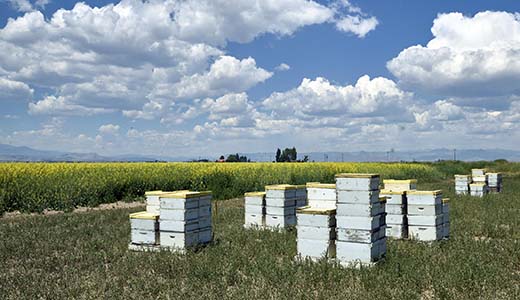 2023
2023
Boxes containing bees beside a field in Rio Grande County, Colorado, 2016. Photograph by Carol M. Highsmith. Library of Congress, Prints and Photographs Division.
During a family photoshoot on March 30 in Arizona’s Buckeye Valley, a woman was stung more than seventy-five times by a swarm of bees. The photoshoot took place during a superbloom of flowers, according to the Arizona Fire and Medical Authority; the response team had to deploy F-500 foam, generally used in firefighting, to calm the insects. The Washington Post consulted Texas Beeworks beekeeper Erika Thompson and UC San Diego ecologist James Nieh on best practices when trying to escape a bee attack.
Try to protect your face by shielding your nose, mouth, and eyes, Thompson said. That will not only prevent you from flailing your arms, which will aggravate the bees more, but it will also reduce the amount of carbon dioxide you exhale, another bee agitator…try to find a safe and enclosed space such as a building or car with the windows rolled up to separate yourself from the angry swarm, Nieh said. If possible, you can also take this step before attempting to run away. Avoid trapping yourself in an area with openings that bees can fit through, such as a garden shed or cave, he added…Do not jump into a body of water. That not only increases the chances that you will get stung when coming up for air, but also your risk of drowning, experts say.
 37 BC
37 BC
Ring, Greek, fifth century bc. The J. Paul Getty Museum, Los Angeles. Digital image courtesy of the Getty’s Open Content Program.
After producing his first collection of pastoral poems, Eclogues, Virgil wrote the Georgics, an ode to traditional Italian agricultural life. Using farming as a way to talk about Roman society, Virgil dedicates a section to apiculture and beekeeping; he was especially fond of bees, having raised them on his father’s farm since childhood, and admired the human nature of the orderly hive. “They live as in an army,” wrote the politician Varro in his On Agriculture. In Book IV of the Georgics, Virgil describes “the fighting swarms.”
Often discord, with great turmoil, seizes two leaders:
and immediately you may know in advance the will of the masses
and, from far off, how their hearts are stirred by war:
since the martial sound of the harsh brass rebukes the lingerers,
and an intermittent noise is heard, like a trumpet blast—
then they gather together restlessly, and their wings quiver,
and they sharpen their stings with their mouths, and flex their legs.
And they swarm round their leader, and the high command,
in crowds, and call out to the enemy with loud cries:
So, when they’ve found a clear spring day, and an open field,
they burst out of the gates: there’s a clash, the noise rises high
in the air, they’re gathered together, mingled in one great ball,
and fall headlong: hail from the sky’s no thicker,
nor is the rain of acorns from a shaken oak-tree…
When you’ve recalled both generals from the fight,
give death to the one that appears weaker, to avoid waste:
and let the stronger one hold power alone.